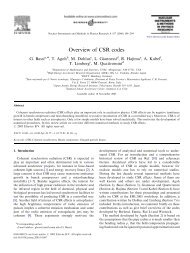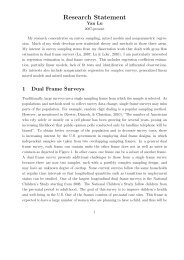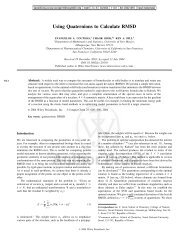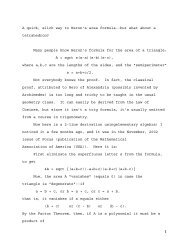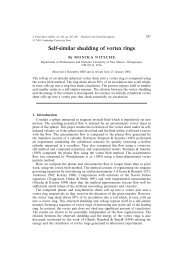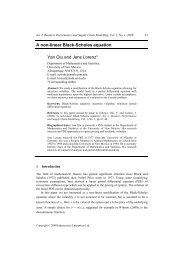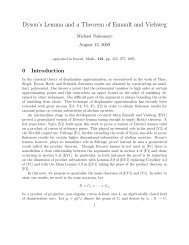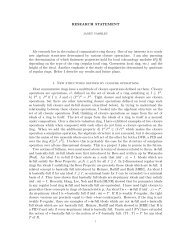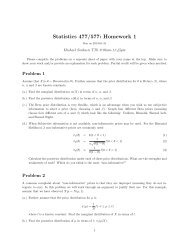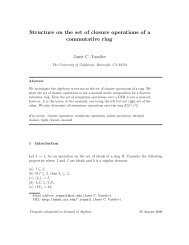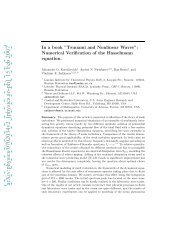OEO Office of Equal Opportunity - Department of Mathematics and ...
OEO Office of Equal Opportunity - Department of Mathematics and ...
OEO Office of Equal Opportunity - Department of Mathematics and ...
Create successful ePaper yourself
Turn your PDF publications into a flip-book with our unique Google optimized e-Paper software.
286 ARTS AND SCIENCES<br />
The <strong>Department</strong> will accept the grade <strong>of</strong> C- in required <strong>and</strong><br />
elective Sociology courses as counting toward graduation<br />
but requires that the student achieve a minimum grade<br />
point average <strong>of</strong> 2.00 in the Sociology major or minor <strong>and</strong><br />
a 2.00 overall grade point average. A cumulative grade<br />
point average <strong>of</strong> 2.25 or better in all courses completed is<br />
required for regular admission to the sociology major.<br />
Major in Criminology<br />
The Sociology <strong>Department</strong> <strong>of</strong>fers a specialized program in<br />
criminology, designed to give students a comprehensive<br />
introduction to the field. Courses focus on the characteristics<br />
<strong>and</strong> causes <strong>of</strong> crime <strong>and</strong> deviance <strong>and</strong> on the origins,<br />
nature <strong>and</strong> consequences <strong>of</strong> societal reactions to crime <strong>and</strong><br />
deviance, giving particular attention to the criminal justice<br />
system. Basic instruction is also given in sociological theory<br />
<strong>and</strong> research methods.<br />
The <strong>Department</strong> will accept the grade <strong>of</strong> C- in required<br />
<strong>and</strong> elective courses in the Criminology major <strong>and</strong> minor<br />
as counting toward graduation but requires that the student<br />
achieve a minimum grade point average <strong>of</strong> 2.00 in<br />
the Criminology major or minor <strong>and</strong> a 2.00 overall grade<br />
point average. A cumulative grade point average <strong>of</strong> 2.25<br />
or better in all courses completed is required for regular<br />
admission to the criminology major.<br />
The program is particularly appropriate for students wishing<br />
to pursue one <strong>of</strong> the following career options:<br />
• graduate work in the social sciences with a special<br />
emphasis on criminology or criminal justice<br />
• a career in criminal justice (e.g., law enforcement, corrections,<br />
crime prevention), especially in agencies or<br />
departments involved in planning <strong>and</strong> evaluation<br />
• a career in law, social work or counseling<br />
Students must complete 40 hours <strong>of</strong> course work in criminology—34<br />
hours core <strong>and</strong> 6 hours <strong>of</strong> pertinent electives as<br />
advised.<br />
Core courses: 101; 205; one <strong>of</strong> 211 or 213; 280; 312; 313;<br />
one <strong>of</strong> 371 or 471; 381; two <strong>of</strong> 412, 414, 416, 418, 423, 424,<br />
425, 426; <strong>and</strong> 481L. Generally, students should follow core<br />
courses in sequence, beginning with 100-level requirements,<br />
proceeding to 200-level requirements, <strong>and</strong> so on. Electives:<br />
students must choose electives from an approved list available<br />
from the <strong>Department</strong> <strong>of</strong> Sociology. Students may not<br />
count the same course as both a core course <strong>and</strong> an elective.<br />
Some upper-division electives require other courses as<br />
prerequisites.<br />
Minor Study Requirements<br />
Minor in Sociology<br />
A sociology minor requires 21 hours (seven courses). The<br />
core courses are 101, 280 <strong>and</strong> either 371 or 471. The 12<br />
elective hours (four courses) are drawn from all sociology<br />
courses not specifically required above but must include<br />
at least 6 hours (two courses) at the 300 <strong>and</strong> 400 level. If<br />
desired, a student may use 371 for the specific requirement<br />
<strong>and</strong> 471 as an elective. If 481L is chosen as an elective, the<br />
total number <strong>of</strong> elective hours will be 13, <strong>and</strong> the total in the<br />
minor will be 22.<br />
Criminology majors may not minor in sociology without a<br />
specially approved degree plan constructed in consultation<br />
with the undergraduate advisor.<br />
Minor in Social Welfare<br />
The minor in social welfare is designed to accompany a major<br />
in criminology, political science, economics, psychology <strong>and</strong><br />
disciplines other than sociology. Sociology majors with a<br />
strong interest in social welfare <strong>and</strong> related topics should<br />
pursue the Human Services & Social Policy Concentration<br />
<strong>of</strong>fered as part <strong>of</strong> the sociology major.<br />
A social welfare minor requires at least 21 hours. The core<br />
courses are 101, 200, 300, <strong>and</strong> 400. In addition, students<br />
must choose at least 9 hours <strong>of</strong> electives from the following<br />
list <strong>of</strong> courses.<br />
Sociology<br />
211 Social Problems<br />
213 Deviant Behavior<br />
216 The Dynamics <strong>of</strong> Prejudice<br />
225 Marriage, Family <strong>and</strong> Their Alternatives<br />
230 Sociology <strong>and</strong> Personality<br />
303 Sociology <strong>of</strong> Political Behavior<br />
308 Sociology <strong>of</strong> Gender<br />
310 Sociology <strong>of</strong> Aging <strong>and</strong> the Aged<br />
321 Sociology <strong>of</strong> Medical Practice<br />
322 Social Epidemiology<br />
326 Sociology <strong>of</strong> New Mexico<br />
345 Youth <strong>and</strong> Society<br />
351 The Urban Community<br />
415 Social Stratification<br />
420 Race <strong>and</strong> Cultural Relations<br />
488 Field Observation <strong>and</strong> Experience<br />
490 Directed Study (limited to topics approved for social<br />
welfare minor)<br />
Anthropology<br />
345 Spanish-speaking peoples <strong>of</strong> the SW<br />
Economics<br />
331 Economics <strong>of</strong> Poverty & Discrimination<br />
335 Health Economics<br />
341 Urban & Regional Economics<br />
Political Science<br />
270 Public Policy & Administration<br />
372 Urban Politics<br />
470 Public Policy Analysis<br />
Psychology<br />
220 Developmental Psychology<br />
231 Psychology <strong>of</strong> Human Sexuality<br />
331 Psychology <strong>of</strong> Personality<br />
332 Abnormal Behavior<br />
Substitution <strong>of</strong> a course not on the elective list is possible only<br />
with the approval <strong>of</strong> a sociology undergraduate advisor.<br />
Students minoring in social welfare must adhere to all prerequisite<br />
requirements attached to the electives. Finally, courses<br />
applied toward a student’s major may not be applied toward a<br />
minor in social welfare.<br />
Minor in Criminology<br />
The criminology minor requires a total <strong>of</strong> 21 hours (seven<br />
courses). The core courses are 101; one <strong>of</strong> 205, 211 or 213;<br />
312; 313; <strong>and</strong> one <strong>of</strong> 412, 414, 416, 418, 423, 424, 425 or<br />
426 (one <strong>of</strong> these is required, but additional courses from<br />
the set may be used as electives). The 21 hours must also<br />
include 6 hours from a list <strong>of</strong> designated electives approved<br />
by the department.<br />
<strong>Department</strong>al Honors<br />
Students may graduate with departmental honors by completing<br />
a specified two-course sequence. The first course,<br />
Sociology 399 (Advanced Undergraduate Workshop in<br />
Sociology) is open to all students <strong>and</strong> seeks to provide an<br />
atmosphere for motivated students to pursue more independent<br />
<strong>and</strong> focused attention to a variety <strong>of</strong> sociological<br />
topics. The second course can be Sociology 490 (Directed<br />
Study), Sociology 499 (Senior Honors Thesis) or any graduate<br />
course in Sociology (500 level). See the <strong>Department</strong>al<br />
Undergraduate Advisor for additional details regarding the<br />
honors program.<br />
UNM CATALOG 2006–2007 Symbols, page 611.



